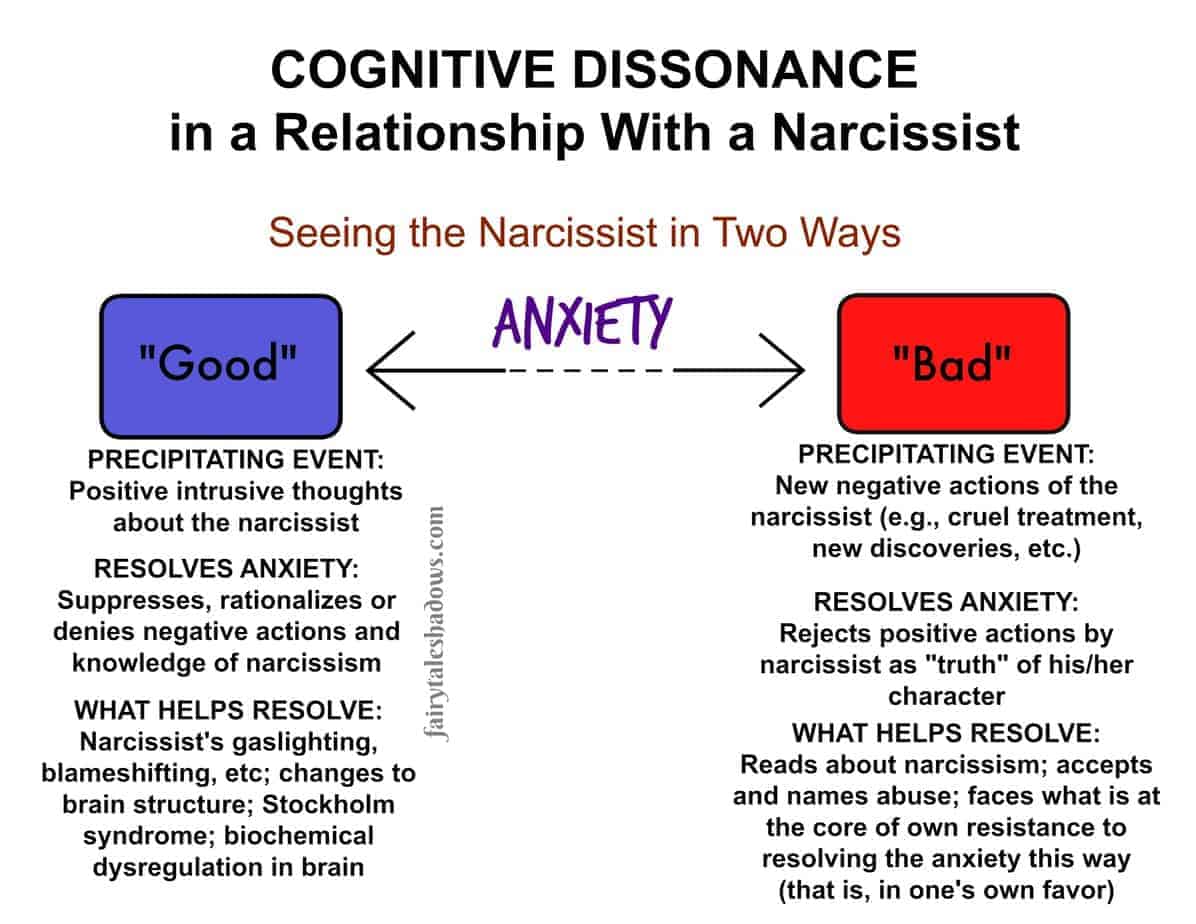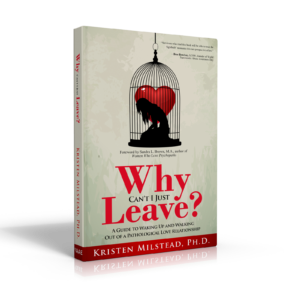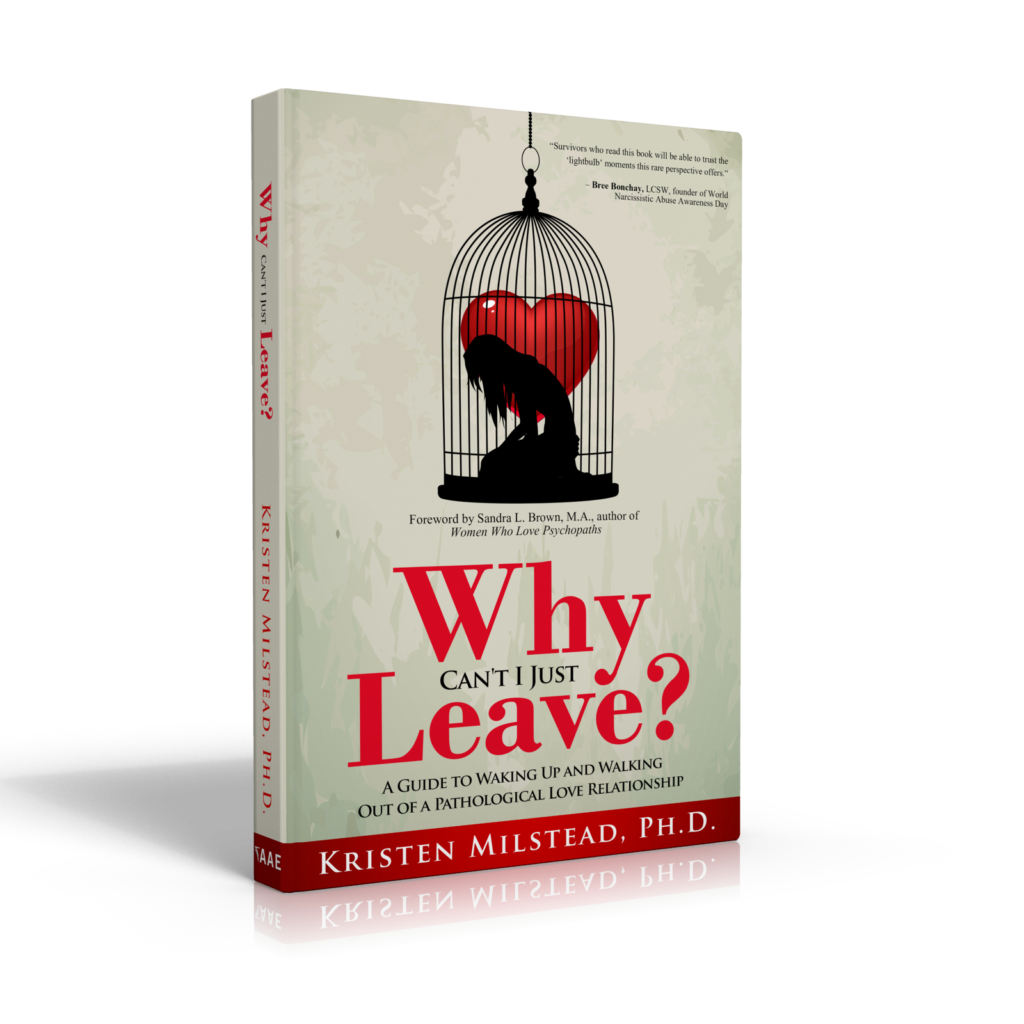By presenting to us what feels like two completely different people, we can become snared in the narcissist’s battle for control over our perception of reality. This is where cognitive dissonance begins.
It is nothing less than mind control and it must be broken.
Want to learn about the five stages of leaving a narcissist? See the end of this post for information about how to read a free preview of my book, which including the first chapter and the pathological love relationship checklist.
What is Cognitive Dissonance?
The idea behind cognitive dissonance is that people will feel so much anxiety when they do something that’s inconsistent with what they personally believe–or when they are confronted with new information–that they will somehow find a way to make everything consistent again psychologically.
Leon Festinger was the psychologist who originally developed this idea. With colleagues, he famously studied a group of people who were convinced that an apocalypse was coming and UFOs were going to visit from planet Clarion and take them away in their spaceships.
The members of the group sold all of their possessions and waited on a mountaintop on the designated day of the apocalypse for the otherworldly visitors to arrive and save them.
The next day when the UFOs didn’t come, surprisingly, instead of giving up their beliefs, some of the group members were even more firm believers than they were before.
They believed that the aliens had been so pleased with their faith, that earth had been spared. In other words, they had reconciled their belief in the impending apocalypse with the fact that it didn’t come by creating a new supporting belief for the original one so they didn’t have to give it up.
Although it’s a very vivid example, I hesitate to use it, because it can create a sense that cognitive dissonance only happens in bizarre circumstances.
Cognitive dissonance is something that happens to us all, however.
Everyday Cognitive Dissonance Turns into a Nightmare When You’re With a Narcissist
Cognitive dissonance is a normal psychological phenomenon that we experience frequently. We are constantly bombarded with information and choices that conflict with what we think we know or causes us to question what it is we really value.
Resolving it is adaptive, something we often do automatically without thinking through consciously what has just happened.
Do you know anyone who:
- Smokes or drinks regularly but is otherwise a health-conscious person (and would claim to be so)?
- Drives rather than takes public transportation when they have a choice, but claims that climate change is an important issue to them?
- Wants to save money for a car, but keeps going out for lunch every day?
Or is it you who does any of these things? This is all normal behavior.
We often find ourselves as we go through our everyday lives confronting information that contradicts what we already believe, and we have to decide how we will manage it.
If we didn’t do this, our reality would not make sense. We could not build a consistent foundation that would enable us to create order out of the world and make decisions about how to proceed with living our lives.
There are many ways that cognitive dissonance can go very wrong, and one of those ways is when someone intentionally manipulates this human, normal cognitive bias to exploit you.
Life with a narcissist takes cognitive dissonance to an entirely new level.
A narcissist will target us and hijack our own minds to them as weapons against us.
The narcissist has intentionally put us in a position of having to constantly review words and actions that do not match. We are consistently being forced to choose what we saw and experienced with our own eyes at one moment versus what happened in the next.
We may be in a near-constant state of hyper-arousal due to the anxiety from the cognitive dissonance.
A narcissist uses our discomfort at holding two opposing ideas about him or her to change our behavior and slowly even change our identities until we are no longer acting in our own best interest.
It’s cognitive abuse.
How Do Narcissists Get Into Our Heads and Control Us?

To outsiders, it might appear that the simplest thing to do to resolve the cognitive dissonance, especially if it causes so much constant discomfort, is to leave the relationship.
There are many reasons why this is highly difficult, and one of them is the nature of cognitive dissonance itself.
When someone has cognitive dissonance, the belief that is the oldest is the most resistant to change, because that person has often built additional secondary beliefs around it and has been living a life that is in sync with that original belief.
These actions create a strong foundation that has to be psychologically and sometimes physically dismantled, which can often leave that person with nothing in its place–a feeling of psychological freefall– while figuring out what goes there instead.
In other words, to change an original view when two views conflict, a lot must happen psychologically.
When it comes to relationships with narcissists, the first beliefs we develop about our narcissistic partners are during the love-bombing stage, where those beliefs bloom and solidify. The beliefs become firmly entrenched and go something like this:
This is my soulmate. No one could understand me and “get” me like this and not truly love me. No one has ever loved me like this. I know that there is are logical explanations for his negative behavior.*
Bree Bonchay, a trauma therapist who works with victims of narcissistic abuse, writes about the importance of cognitive dissonance in keeping victims tied to their abusers:
“The love-bombing of the idealization stage of a toxic relationship sows the initial seeds of cognitive dissonance. The narcissist fakes being the ideal partner by saying and doing all the right things. They pretend to be everything we ever dreamed of and shower us with promises of perfect and eternal love.
“We are conned into believing the narcissist is the best partner we’ve ever had and the most wonderful person on the planet. We trust their promises and believe they’re able to love wholeheartedly, and without limits, in the same way, we do…
“By the time the devaluation stage occurs, and the narcissist’s behavior begins to deviate from the way they first acted, our positive regard for them, and our beliefs about their good character and intentions, have grown like weeds that have permeated, and become firmly rooted throughout our minds.”
This is why love-bombing is the most dangerous stage of a relationship with a narcissist. The tactics employed during this phase are psychologically powerful and they become the first view we ever have of the narcissist– not impossible to dislodge, but very formidable.
Cognitive Dissonance: A Set-Up for the Narcissist
Once the love-bombing stops and the devaluation begins, or we begin to see behind the mask, we start to feel the effects of the cognitive dissonance and this is when we truly become ensnared.
Bonchay describes what partners of narcissists end up doing in order to resolve the cognitive dissonance– the types of things that we might do in the more benign situations:
“We reject the facts (denial). We explain them away (rationalize), or ignore the new information altogether. We may try to convince ourselves that no conflict really exists, and the problem must be our fault. Or, we may attempt to reconcile the distance between our beliefs and the new facts, through easing the gap, by focusing on our memories of how the narcissist used to be.”
What happens then is that our reality becomes completely distorted during this time because of consistent contact with the pathological worldview of the narcissist and a break down of the normal psychological mechanisms of confronting such pathology in the partner, partially due to those other effects of remaining in close contact with the narcissist.
We begin to lose the ability to perform executive functions, for example.
Sandra L. Brown writes in her book Women Who Love Psychopaths**:
“This unique feature [of the psychopath] is the unbelievable contradictions, opposites, and dichotomies that mark this man as the disordered person he is. This is what separates pathological love relationships from other merely bad breakups.”
“These inconsistent and totally contradictory statements, behaviors, and beliefs cause women to feel like they are going crazy in the relationship. The exposure of his dichotomous beliefs and behaviors begins when he can no longer completely function in the mirage he first created. They signal the end of the ‘bait’ and the beginning of the ‘switch.’
“According to some of the women, nothing prepares a woman for a relationship with a psychopathic man, where underneath none of the elements of a healthy relationship are present…
“She begins to question her own experiences beliefs and thoughts the more he insists that their relationship is normal, not the other ones she has had, the more she begins to think she is “crazy” or something is wrong with her that she doesn’t understand the basics of what makes a good relationship.
“Once he convinces her that their relationship is normal, he can start to shift her reality-off base he sets up a double-bind where she begins to work harder at the pathological relationship… While he is telling her she just isn’t measuring up and no wonder she hasn’t had successful relationships” (p. 204-5).
The cognitive dissonance allows our narcissistic partners to split us in two along the lines of the two beliefs regarding who he or she really is.
“Her inability to stay on the same thought page about ‘who’ he is and have one consistent view of him increases the ‘ping-pong’ effect in her mind.
“As soon as she tries to get herself on the ‘he’s bad for me’ page, up pops a positive intrusive thought of a time she perceives him as ‘good.’ When she tries to realign herself to get on the ‘he’s good for me page,’ up pops an emotional pressure to find out he was cheating.
“She never stays consistently on one page about how she views him so she never really finishes a thought and never really connects to a firm decision about how to handle the relationship. Instead, she’s pulled back and forth with the ‘ping-ponging’ without ever resolving even one conflicting thought.
“Nothing changes because she never completes a thought without being pulled to the dichotomous opposite belief she was just having” (Brown, p. 241).
Why the Cognitive Dissonance is So Bad for Us
Because of the permanent state of cognitive dissonance, we:
- don’t realize we are being abused (because we suppress or rationalize the knowledge of negative treatment) — although there may be some moments of clarity, which we then suppress because they are more difficult to accept– more on this below
- become loyal to him or her and may hide the abuse from others even if we have acknowledged it to ourselves
- stay in the situation and allow him or her to keep exploiting us
- stay in a perpetual state of anxiety and fight-or-flight awareness and our physical and mental health may decline
- even after the relationship ends, we can continue to struggle with cognitive dissonance– understanding the abuse, our role (or lack thereof), who the narcissist was and what happened
This all happens partially because it is not only our thoughts about the narcissist that are divided because of the cognitive dissonance. It is also our thoughts about ourselves that become split in two. We may have thoughts such as these:
I love him so much, and I know he loves me. We have such a strong connection. I’ve never had this connection with anyone else. I should give him another chance. He said he wouldn’t still be here if he didn’t love me, and I guess he’s right. Why am I letting all these other things still matter? If I’d just stop talking about them, they would go away. Maybe I am the bad one. Maybe he’s right.*
These thoughts are actually rationalizations that keep us in an abusive situation.
Why The Cognitive Dissonance Hurts So Much
Brown (p. 238-242) says that the most troubling effects on the women in her study of those coming out of relationships with psychopaths were cognitive dissonance and intrusive thoughts.
She describes how it’s normal when people go through trauma to have intrusive thoughts about the experience. The unique thing about being in a relationship with a psychopath, however, is that the intrusive thoughts focus on the positive aspects of their partner and the relationship.
This is because the positive thought that creeps in does not match all of what she experienced so those memories keep popping into her mind.
The women continue to have anxiety because of this cognitive dissonance about their views of him and their own feelings. For example, despite the abuse, they might not be able to stop missing him and this causes suffering.
Sometimes the incongruous emotions caused so much anxiety that it also led to the women going back to the psychopath when they said they wouldn’t and knew they shouldn’t.
They would go back to relieve the anxiety and suffering caused by the continued cognitive dissonance that existed because of the instilled positive views.
This suggests a cyclical pattern based on a constant relief of anxiety.
The Anxiety Spell That Must Be Broken
The cycle of cognitive dissonance has us constantly shifting between seeing them as either “good” or “bad.”
Yet we can’t stay in either state forever, where we are just seeing them as one. There is always a precipitating event that causes us to start to see them both ways again. Therefore, the anxiety always returns and we are seeking to find ways to resolve it.

When we want to see them as good, we suppress or deny the negative behavior and knowledge of narcissism. We are more likely to accept the blame for what has been going wrong and more amenable to the narcissist’s hoovering and love-bombing.
If we are still close to the narcissist, we probably still have a trauma bond and neurochemical dysregulation, all of which make it easier to suppress knowledge of the narcissist’s bad behavior as well.
When we want to see the narcissist as bad, we reject the good things they try to do and see through them. We see them as toxic and don’t believe their lies or that they can change. We are tired of their abuse and don’t want to tolerate it anymore and feel angry and disgusted by their behavior.
Their worldview doesn’t feel like our “truth,” it feels pathological and crazy. Reading about narcissism and talking to other people helps.
Breaking the Spell of Cognitive Dissonance
Brown (p. 241) says that the only way out of suffering is to stop the positive intrusive thoughts of the narcissist, and, by extension, what I have been referring to as ending idealization of the narcissist and the relationship.
She states that that will partially involve examining why we have been resistant to dismantling the positive view of the narcissist.
The narcissist has turned our own minds against us, and now it is up to us to figure out what it is inside of us that we are scared to let go of and face it in order to save ourselves. The narcissist is using it to control us.
- Are we afraid that if we accept that the narcissist is pathological, there is no hope?
- Do we have a fear of being alone?
- Are we afraid we are too damaged to have another relationship?
- Did the narcissist implant beliefs in us about ourselves or the nature of our relationship with him or her that make us believe that we don’t deserve a good relationship, or that we will never have another one?
- Have we been led to believe this is what a relationship “with passion” is supposed to look like and that we will never be happy with another relationship again?
- Are we worried since this is the person we chose and we didn’t recognize the pathology that means there is something wrong with us?
- Do we worry the problem is us and if we don’t keep trying, he or she is just going to be happy with someone else?
- Are we worried about the time investment?
- Do we keep holding on to this because it’s painful to think about the fact that we weren’t loved in the same way we loved or that we were lied to and used?
As painful as these things are, they aren’t as painful as what is being done to us in this relationship the longer it goes on.
Waking Up
“Women don’t feel like they have hit recovery until they can manage their most distressing symptoms of intrusive thoughts and cognitive dissonance… Intrusive thoughts are created, in part, by trying to stay away from information or feelings she doesn’t want to deal with. The longer she doesn’t deal with it, the longer she has intrusive thoughts.” (Brown, p. 238).
So how good was (or is) your narcissistic partner at giving you what you needed to stay asleep?
Not good enough– that’s why you’re reading this.
Your partner can never be good enough to keep you asleep and use your own mind against you forever– no matter how much he or she would like to believe it– and like for you to believe it too.
In summary, what is causing the strongest bond with the narcissist and is the most difficult to break is cognitive dissonance.
This is anxiety, discomfort, and suffering in our own minds purposely manufactured from the beginning because of the love-bombing in the idealization stage and it will last throughout the relationship and even after it is over– until and unless we decide to do something about it.
Want to read about the five stages of leaving a narcissist?
Why Can’t I Just Leave? takes you step-by-step through the path of how you got here and helps lead you straight to the exit.
Click here to read a free preview
This isn’t your typical survivor recovery book. When you read it, you’ll learn about:
- What over 600 survivors said about their experiences and how they left their relationships
- 75 signs that you’re in a pathological love relationship
- What makes narcissistic abuse unique
- The most damaging effect of narcissistic abuse
- Why we change while we’re in the relationship
- The five stages of breaking up with a pathological partner
- Pop culture and celebrity examples of narcissistic abuse
- My personal story
Years in the making, this book creates a bridge between the first-hand knowledge of narcissistic abuse by survivors with lived experience and the social psychological research on the interpersonal and group dynamics of high-control relationships.
The heart of the book is explaining why we do things in these relationships we don’t understand and how we can stop.
Available in ebook, paperback, and hardback!
If you’d like to read a free preview, which includes the first chapter and the pathological love relationship checklist, click on this link.







25 Comments
Michelle
Hi,
I have read loads of articles and read this one as I am wanting to find some resources to deal with the continuing narcissistic behaviours through the ever slow legal process.
I left a marriage of 32years August 2019, way to late, but the snap happened…my health was extremely poor, I had lost control of all access to finances etc etc etc etc…..the list is enormous. I saw things going wrong but was financial dependent amongst other things, including he had managed to get me diagnosed with Dementia and he managed to get my drivers licence cancelled and removed my car.
On the 2o August 2019, he was coming home from the office, as I had again questioned items I had uncovered. He was coming home to placate me once again.
I called the police and a dear friend for assistance in attempt to have him removed. of course I was the individual being assessed because of the diagnosis. However, he the police did issue a 24hr restraining order on him. I rang my sister the next day and said I was not going back. My family have supported me, I am extremely lucky.
But in the legal process he does not disclose appropriate information, keeps stalling, manipulating the statements sent, adding blaming information and so forth, via his lawyer who seems no better in character than he is.
I try to keep focus on the issue at hand, being financial separation. He keeps balking, as funds have been placed from one place to another to another. In the passed year I have not come very far with the legal process.
Do you have ideas to assist?
I am in Western Australia
Guy
Hi Kirsten, so interesting to read about this makes so much sense. Of course, it’s always complicated, and the problem that Brown does not touch upon above is when you have a child together, it’s not about the love-bombing necessarily being the bond that ties (that never really worked on me), but it is about love, shared experience and about protecting the child. In my case, I know that if I leave then my 9 year old will be totally exposed to her mother’s illness, and it will damage her a great deal more. So I want to stick around to help her become as stable and spiritually well as I can. And then there’s my wife. She’s an inverted narc with malignant tendencies, which were fuelled by my ignorance of her illness over the years, and the subsequent fallout. Now I’m perhaps unusually helped, because of the depth of my faith in God, the ground under my feet is rock solid, but for sure there is a lot of cog diss in my life, it’s a constant yo-yo that I could do without. I’ve seen my exec function diminish considerably over the years, and I know that I would be far more effective if my life were different. But anyway, having a child with a narc makes it way more complicated, that’s really the point. Also, I don’t at all feel complete apathy for her, in fact knowledge of her condition has helped me to understand myself and ultimately her too. Because almost NOBODY is all bad, even though it’s feels like it at times that they’re rotten to the core, there’s always hope as i strongly believe in the transformational power of uplifting prayer (at least when I can get myself to do it ;)) So for the time being at least, and who knows maybe even for the rest of eternity, I will stand by her, because when I had a child with her I effectively made her my wife, at least that’s how I see it. I’m not saying this is what others should do, it’s just what I feel able to do. Thanks, Guy
Sharon
I love this Guy! I totally agree with you ?!
Max
Kristen, I’m so glad to have stumbled across your page. I’ve read so much and everything about my relationship makes so much sense now. The woman I had been involved with had told me she loved within a month of meeting her. Everything was perfect at the beginning – yet the following 2 years would be 2 years of being belittled about my appearance and habits, being made out to be the worst person on Earth to all of her friends, being kept hidden from her parents, she tried to convince me I’m bipolar, and I was always kept out of an official relationship with excuses like “I need to learn how to love myself first” and “I don’t think I’ll ever be ready for a relationship with anyone”. Yet as horrible as she she made me out to be, she continued to keep me around, was never straightforward with me, and used me for sex. She finally discarded me at the beginning of the pandemic. Things were going ok at first – we were calling to check up on each other, etc. But then she got extremely quiet out of nowhere and when I confronted her about it we got into an argument. She blocked and ghosted me. Literally a week before that she was saying that she missed me, leaving me confused. Two months of no contact later, she e-mails me to reveal that she already has a new boyfriend, it’s already an official relationship, and that she’s the happiest she’s ever been. Considering everything on this website, they probably had started talking sooner than that. I thought this person would at the very least be a lifelong friend. Anyways, I’m just glad I’m not the source of supply anymore and I shouldn’t have ignored the many red flags that existed when I first met her.
Renna
What needed information I received, and am going to be my own person for learning what I have to do.
I did my best in a 30 year marriage, and left him 3 years ago.
Best thing I ever did in my life.
He was destroying me, and I let him be who he is never wanting to end it all. Thank you !
Ang
I left my Narc. Over a year ago… I am still struggling. I go back and forth between loving him and wanting to be with him again, and then hating him. I can go weeks without communication and be fine but once he reaches out to me I fall right back into it. I can’t stop thinking about him and it’s almost like I forget/forgive all the abuse he put me through and I somehow tell myself he has changed… I am
9 months pregnant with another mans child who I am not in any kind of relationship with. It has been very difficult for me and my Narc seems to be there for me, even telling me he wishes it were his and that he wants to be there for us and take care of us. I believed this and even agreed to meet up with him once, we just talked. After this I Began obsessing, wanting to be with him again. It was so nice to talk and catch up and he made me feel like he did in the beginning. I even tried to convince my family (who hates him) that he has changed and I am thinking about giving it another chance. He hasn’t contacted me since. No texts or calls. And I am left feeling empty. More empty then before. Deep down I know he’s playing on my emotions during this vulnerable time. I just don’t know how to get over it. What is wrong with me? Why can’t I see my worth, I know I deserve better but I just can’t understand why this happened.
Joe
Wow! That is all I can say! I loved this and hated it at the same time. Because it reflects my life. Kristen…. you have brought so much perspective into my life. I sometimes feel ashamed and embarrassed of what she has done to me and how she has made me feel but you have helped me in so many ways. I am so glad that you have devoted so much time to helping others realize the travesty that these kind of people inflict on others. It is literally unreal. Thank you so much for being who you are! ❤
Kristen Milstead
Hello Joe: I understand exactly what you’re talking about with the loving and hating the information because it breaks down many of the ideas we have come to believe and some of them we very much want to be true, but it also sets us free. There is no reason to be ashamed and embarrassed and that is so much what I want to get across. I’m so glad it is helpful to you. Thank you for taking the time to comment. Please take care,
Kristen
C green
I have been through all of the above, now I am grateful because I am so strong I have done things by myself I never expected and it’s because this person took me to the pit of despair. Now I thank him because I have found my strengths, all the bad stuff is his to carry, he will never be happy, who can when you need people to feed from. I don’t need anyone to feed off, I am far stronger than that and able to love how blessed am I, I pity him.
Lesley
Jacky thanks for your reply to my comment. Last night & today were particularly difficult, but l have strong women around me & as l learn more about the narcissism the stronger l feel (at least until l see him again). Lesley
Lesley
Jacky thanks for your reply to my comment. Last night & today were particularly difficult, but l have strong women around me & as l learn more about the narcissism the stronger l feel (at least until l see him again). Lesley
Lesley Airey
Jacky your comment was posted more or less on the day the love-bombing began for me. Just over 2 months later, l’m now in the cognitive dissonance stage and am being torn apart by the conflicting views l have on his behaviour. To make it even more difficult, he is an alcoholic who, 2 weeks ago, had 2 alcoholic fits in front of me. A few days later, he was angry with me for telling his friends & has barely spoken to me. I can rationalise his behaviour till the cows come home, but then l get torn apart all over again. I’m nowhere near the “no contact” stage because l miss being with him. My friends think l’m mad (they’re probably right) but they haven’t been in a relationship with a narcissist, so they can’t understand the pull to the stimulus, as it were. I have no idea how this is going to play out, except that it will all end in tears. At the moment l can’t live with him, can’t live without him & l feel physically sick at either prospect.
Jacky
Hi Lesley,
Thank you for your message. I’m so sorry you feel like this. Make yourself strong and keep taking care of yourself. It’s a difficult road you are on so you have to be kind to yourself. Keep in contact. You can ask my e-mail through Kristen if you want to.
Jacky?
What a Narcissist Says About Break-Ups: They Never Let You Go | In the Shadows of the Fairy Tale
[…] The Biggest Weapon Narcissists Use Against Us: Our Own Minds […]
TPot
They’re amazing actors! Mine always claimed she couldn’t decide anything for herself, she’s just delusional. What she really does it tell everyone what she wants them to repeat back to her… mirrors them or good people, but there’s no real emotion other than some twisted self preservation. They are mentally Ill but they hurt people maliciously in the deepest ways possible so it’s hard to feel any real sympathy. The person who you loved was a mirror of you if that helps anyone, they try to project all their issues onto their victim and then destroy that person… it doesn’t work, we can heal but they’ll always be broken.
Kristen Milstead
Hi Sharfa: You are so welcome. I’m glad to hear that you are making so much progress. It sounds as if you are on the right track and it’s wonderful that you have made the realizations about the relationship that you have and have been able to start moving forward. Thank you for taking the time to share, as it’s an inspiration to so many others. Stay strong! -Kristen
Sharfa
Things only change once you see the behaviour for what it is. I’m only there now after 9 years of marriage. It has devastated my self trust but I’m waking up to the reality of what is. I’ve made enormous progress and daily I amaze myself how I let this behaviour corrode my life. This article is by far the best I’ve discovered…..it placed so much into perspective and reinforces my determination to not survive but thrive. Thank you so much for sharing.
TPot
They’re amazing actors! Mine always claimed she couldn’t decide anything for herself, she’s just delusional. What she really does it tell everyone what she wants them to repeat back to her… mirrors them or good people, but there’s no real emotion other than some twisted self preservation. They are mentally Ill but they hurt people maliciously in the deepest ways possible so it’s hard to feel any real sympathy. The person who you loved was a mirror of you if that helps anyone, they try to project all their issues onto their victim and then destroy that person… it doesn’t work, we can heal but they’ll always be broken.h
Sharfa
Things only change once you see the behaviour for what it is. I’m only there now after 9 years of marriage. It has devastated my self trust but I’m waking up to the reality of what is. I’ve made enormous progress and daily I amaze myself how I let this behaviour corrode my life. This article is by far the best I’ve discovered…..it placed so much into perspective and reinforces my determination to not survive but thrive. Thank you so much for sharing.
Kristen Milstead
Hi Sharfa: You are so welcome. I’m glad to hear that you are making so much progress. It sounds as if you are on the right track and it’s wonderful that you have made the realizations about the relationship that you have and have been able to start moving forward. Thank you for taking the time to share, as it’s an inspiration to so many others. Stay strong! -Kristen
Kristen Milstead
Hi Jacky. How are you? I’m glad you’re here and you found this article. I am sorry about what you are going through right now. I agree that it is very difficult to accept. The way to break out of the cognitive dissonance is to confront it. He will likely never let you go– and even if he did, the cognitive dissonance would remain unless you challenge the two images you have of him. You have to let go of the positive images you have of him to save yourself, and in order to do that, you have to understand internally what keeps you holding onto them. Only you can answer that question, and until you are ready to let them go, you will be bound to him and vulnerable to him. Please stay safe. -Kristen
Jacky
It’s almost impossible to understand and accept that a person can think, feel and behave like a narcissist because we are not like them, we have empathy.
I’m seeing him more and more for who he is and i feel guilty because of my thoughts and try to safe him and make things better. Just like i tried to safe my mother but it did’nt work. I’m trapped because i’m still trying…
Still afraid to be not good enough, hoping for the love and attention i needed and missed.
The narcissist feeds himself with my pattern. He keeps me there(cognitive dissonance) so i will keep giving and giving hoping to get love and attention. He’s a taker. Its about what he can get from me…not what he can give me.
Thanks Kristen for this article. It helps finding my way and feeling not so alone.
Jacky
It’s almost impossible to understand and accept that a person can think, feel and behave like a narcissist because we are not like them, we have empathy.
I’m seeing him more and more for who he is and i feel guilty because of my thoughts and try to safe him and make things better. Just like i tried to safe my mother but it did’nt work. I’m trapped because i’m still trying…
Still afraid to be not good enough, hoping for the love and attention i needed and missed.
The narcissist feeds himself with my pattern. He keeps me there(cognitive dissonance) so i will keep giving and giving hoping to get love and attention. He’s a taker. Its about what he can get from me…not what he can give me.
Thanks Kristen for this article. It helps finding my way and feeling not so alone.
Kristen Milstead
Hi Jacky. How are you? I’m glad you’re here and you found this article. I am sorry about what you are going through right now. I agree that it is very difficult to accept. The way to break out of the cognitive dissonance is to confront it. He will likely never let you go– and even if he did, the cognitive dissonance would remain unless you challenge the two images you have of him. You have to let go of the positive images you have of him to save yourself, and in order to do that, you have to understand internally what keeps you holding onto them. Only you can answer that question, and until you are ready to let them go, you will be bound to him and vulnerable to him. Please stay safe. -Kristen
Lesley Airey
Jacky your comment was posted more or less on the day the love-bombing began for me. Just over 2 months later, l’m now in the cognitive dissonance stage and am being torn apart by the conflicting views l have on his behaviour. To make it even more difficult, he is an alcoholic who, 2 weeks ago, had 2 alcoholic fits in front of me. A few days later, he was angry with me for telling his friends & has barely spoken to me. I can rationalise his behaviour till the cows come home, but then l get torn apart all over again. I’m nowhere near the “no contact” stage because l miss being with him. My friends think l’m mad (they’re probably right) but they haven’t been in a relationship with a narcissist, so they can’t understand the pull to the stimulus, as it were. I have no idea how this is going to play out, except that it will all end in tears. At the moment l can’t live with him, can’t live without him & l feel physically sick at either prospect.